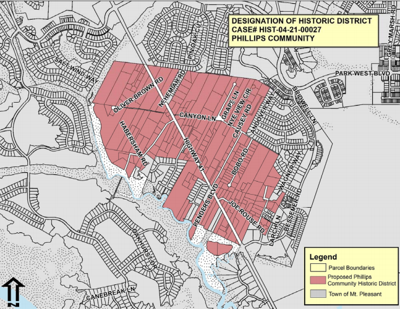At first blush, the town of Mount Pleasant's move to annex 9 acres of mostly undeveloped property in the Phillips Community seems ill-advised. Parallel efforts are underway to list the historic African American settlement community on both the National Register of Historic Places and Charleston County's list of historic properties and sites. The latter would mean that the county's new Historic Preservation Commission would have to approve any new development plans to ensure they don't harm the community's character — unless an annexation strips it of that authority.
The reality is more complicated, but what's going on here underscores the need for both the town and the county — and other local governments in the region — to identify settlement communities and cooperate in protecting them.
Both the Preservation Society of Charleston and the Historic Charleston foundation are urging Mount Pleasant Town Council not to proceed with the annexation when it comes up for a final vote Aug. 10. The society sent a letter to town officials saying the annexation "threatens the consistent approach to land use in the Phillips Community, a component that factors into its integrity as a historic district." Foundation CEO Winslow Hastie said the annexation "goes against this whole effort to preserve this area as a cohesive place."
That would be a bitter blow, particularly after the recent success in staving off a plan to widen S.C. Highway 41 to five lanes — a plan many believed would have destroyed the community's historic integrity. Will Phillips win its road battle only to lose a larger war for its survival?
It's an unsettling question, and Town Council's rejection of the annexation would provide an answer that many would find comforting.
In fact, though, that answer would simply shift the battleground.
If the town were to reject the annexation, the property owner still would be able to obtain water and sewer service from the town — just as if the annexation were OK'd. And the availability of those services ultimately could pave the way for denser suburban development not in character with the Phillips Community's rural feel. (A 6-acre parcel of the 9 acres at issue already is listed for sale for $1.3 million.)
Mount Pleasant Mayor Will Haynie notes that while the town gave initial approval to the annexation, it also voted down a related request to rezone the property as part of the Dunes West development plan. Instead, he said the town will zone it community conservation, which could give the tract as much protection against inappropriate development as it would have if it remains in the county. "The days of annexing something into Mount Pleasant and it becoming high-density development are over," he said. "The voters have spoken.”
We hope he's right about Phillips. Town Councilwoman G.M. Whitley, who has led efforts to improve relations between the town and the settlement communities, said something similarly reassuring: "Regardless of whether annexation is denied or accepted, the property can access sewer and water through Mount Pleasant Waterworks, so the property becomes developable. What matters in preserving the Phillips Community is the zoning."
We remain a strong supporter of giving the Phillips Community the historic recognition and protection it both desires and deserves, but we also recognize there's more than one way to accomplish that. The most important thing is for the town and the county to work together so less sensitive developers can't play one local government against another to get what they want — and what those seeking to preserve the Phillips Community absolutely do not want.







